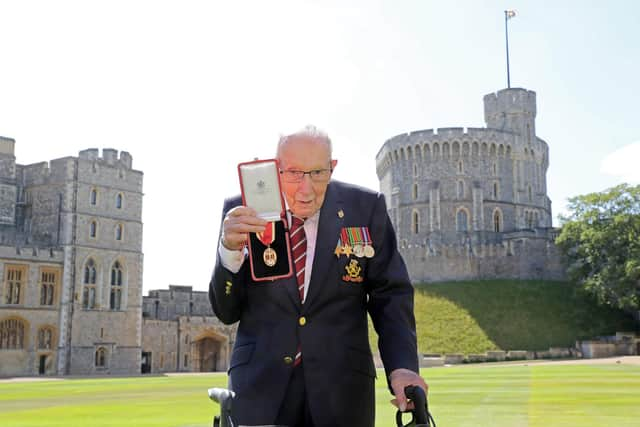Captain Sir Tom Moore found himself turned into a 'national hero', obscuring the reason for his charity walks: NHS underfunding – Laura Waddell
The Captain Tom Foundation is in the news again, as Newsnight reports on financial curiosities surrounding it and Hannah Ingram-Moore’s family charity. It makes me reflect on what a distraction the hero worship was in the first place.
I have read nothing about Captain Sir Tom Moore that has persuaded me his individual contribution to the Covid effort was significantly more impressive than any individual doctor, nurse, teacher, carer, street sweeper, supermarket worker, delivery driver, do-gooder, or even child doing their bit to keep up morale. Rather, media interest and institutional patronage that supercharged donations to his fundraising campaign have constructed the popular myth the man was a hero.
Advertisement
Hide AdAdvertisement
Hide AdTime and time again British businesses and institutions have stripped this man’s achievement from its connection to collectivity and pulling together in common interest, and reduced it to celebrity. The RAF fly by on his birthday. An audience with the Queen. His face on a stamp – an honour previously reserved for ‘Great Britons’ like David Lloyd George, architect of the welfare state.
‘How Capt Sir Tom Moore became the nation’s hero’ is a typical assumptive headline among the reams of coverage. Political leaders eulogised his passing. Boris Johnson, then Prime Minister, released a statement, as the Number 10 flag flew at half mast, stating: “He became not just a national inspiration but a beacon of hope for the world.” Keir Starmer, naturally, was right behind the Tories eulogise a symbol of Britishness.
But the problem is, I don’t think Moore’s fundraising was heroic. I think it’s a fine athletic achievement at an advanced age, demonstrating good intentions and a caring nature. But one man’s laps around his own garden were so massively blown out of proportion during the Covid years that I find it not cheering, not hopeful, but actually rather grotesque to take in the list of endless special recognitions meted out to one man turned mascot, with the funding shortfalls his walk set out to address, obscured.
‘Captain Tom fever’ reached its peak with the Barbados trip offered by British Airways, after which the family complained that cruel comments online were detrimental to their happiness at a difficult time. No one wants to read mean things about themselves; and few seemed to blame the family members for accepting a luxury trip, hashtagging it #Tomsbucketlist and all.
But I still find it gobsmacking that an airline saw fit to make this gesture of excess during the global pandemic, after people had been separated from their loved ones during lockdown, crawling the walls of their own homes desperate to travel but told they couldn’t. It’s amazing there was any positive reception to the stunt at all.


Don’t get me wrong. There is no doubt Moore’s walk inspired others, particularly resonant with the very old and the very young. Among them, Dabirul Choudhury, a fellow 100-year-old, raised more than £150,000 by walking during Ramadan. When Captain Tom passed, there was a touching comment from Choudhury’s son reporting how his father was affected. “Even now, my father hasn't actually eaten since he's heard about the news [of Moore’s death].” At 104, Ruth Sanders walked the equivalent of a marathon to raise money for Thames Valley Air Ambulance, crediting Moore as an inspiration.
Humans coming together to provide for their community is more authentically inspiring – and more reflective of the spirit of collectivity that underpins the NHS – than ostentatious hero worship of any one individual with the luck or concerted PR effort to go viral. That Moore’s walk sparked a perfect storm of media attention is ultimately the only key difference between his effort and other fundraisers.
His walk was originally an activity designed for a 100-year-old to celebrate his birthday, in the wake of a cancelled party. It was never a Herculean effort of unusual merit. But British culture loves to erect hierarchy and queue to pay deference. When the serious crisis of NHS funding shortfalls was so absorbed into the congratulatory deification of one man, it was fair to say the point of his endeavour was long lost.
Advertisement
Hide AdAdvertisement
Hide AdStripped from its meaning, the applause from political hands was more evocative of Britain’s chronic nostalgia for its glory days of winning wars than the collective effort to fight the pandemic in the 21st century. What became foreground was not the persistent – and political – shortfall in funds for our most essential service, at a time its importance to our society was apparent on a mass scale, but the bootstraps spirit suggested by the military uniform on the mascot.
The whole charade became jingoistic, self-congratulatory, and completely removed from the catastrophic weaknesses the pandemic exposed in the NHS, in no small part due to its chronic underfunding by successions of Tory governments. While the staff of the NHS are overworked, exhausted, and underfunded, we have a ruling party more interested in lining the pockets of cronies with dodgy PPE deals. There is no shortfall of things this kind of funding could be spent on.
To put this into perspective, £9 billion was written off by England’s Department of Health for personal protective equipment that was defective or unusable in a healthcare setting, a figure that eclipses the fundraising efforts of individual citizens – even the millions raised by the Captain Tom campaign. Citizens should wonder whether a trick of distraction was played on them by the politicians and institutions keen to co-opt his efforts as a flag-waving opportunity for brand Britain.
Comments
Want to join the conversation? Please or to comment on this article.
